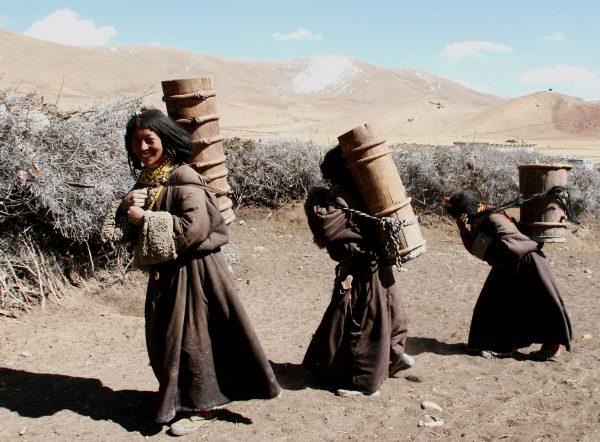The Chinese regime recently rolled out two new plans that look contradictory on the surface but actually serve similar purposes.
Beijing has operated a strict household registration system, known as “hukou” in Chinese, since 1949, that has restricted citizens’ movements based on where they are born. There are two primary groups: urban residents with a non-agricultural hukou and rural residents with an agricultural hukou. Each person can only have one hukou. The former usually entitles a citizen to access to better health care and education opportunities.
With this system, urban residents cannot work on a farm, while a rural resident cannot work in the city. But since the 1980s, restrictions have loosened as more migrant workers choose to move from the countryside to the city in search of higher, more stable income. Migrant workers today are allowed to work, but often do not have health insurance, pension, or other government benefits.
The Chinese regime recently announced that it would ease such hukou restrictions and allow 100 million villagers to move to urban areas.
At the same time, it announced plans to move 10 million unemployed youth from cities to the countryside.
Villagers Move to Cities
The National Development and Reform Commission (NDRC) released its tasks for the 2019 year on April 8, including encouraging villagers to give up their agricultural hukou and move to big, middle, or small-size cities.The NDRC mandated that each city government must enact measures to give 100 million rural residents a city hukou.
However, large cities such as Beijing, Shanghai, and Guangzhou, will keep the current hukou policy—which only grants a city hukou to those who meet stringent government standards or Party officials who can pay an exorbitant fee (the latter system is not open to the public).
This policy is meant to encourage people from rural areas to move to lower-tier cities, where they can get access to better health care and education.
However, those who move to the cities will lose their rural hukou, including their land and any property in their home village. Adding the burden of buying or renting an apartment in the city, this means a permanent move to the city is only a viable choice for those rural inhabitants who are relatively well-off.
The state-run Beijing Daily reported on April 12 the true reason for Beijing’s sudden change of heart: New rural residents who move into the cities can help stimulate the local real estate market.
The report used Tianjin City as an example. The municipal government launched a program in 2018, that gives well-educated people the ability to earn a Tianjin hukou.
“The real estate market became hot in Tianjin [after the plan was launched],” the report said.
In April 2018, about 4,000 apartments were sold in Tianjin. In the following month—the first month after the new policy was launched—more than 9,000 apartments were sold.
Frank Tian Xie, a professor of business and marketing at the University of South Carolina–Aiken, similarly told the Chinese-language Epoch Times in an April 9 interview that the Chinese regime is easing hukou restrictions because it wants to sell any unwanted real estate properties in these smaller markets.

Kangba women carry barrels to fetch water at a village in Zuogong County of Tibet, China on April 10, 2005. China Photos/Getty Images
Youth Moving to the Countryside
Meanwhile, the central committee of the Communist Youth League, an organization for cadre hopefuls, released an order on March 22, requiring 10 million youth to move to rural areas within three years.In the name of “rural revitalization” and “modernizing agriculture and the countryside,” the Youth League set the goals of having at least 10,000 Youth League members become low-level officials in rural areas; train 200,000 youth to be business leaders in rural areas; and arrange at least 10 million college or university graduates to be volunteers “to build the culture, technology, and health care fields in the countryside before 2022.”
This order is reminiscent of a time during the Cultural Revolution when urban youth in middle school, high school, and university were forcibly sent to the countryside to work in the fields. Known as the “Up to the Mountains and Down to the Countryside Movement,” then-Party leader Mao Zedong launched this effort in the late 1960s as part of his campaign to rid youth of “pro-bourgeois” thinking and learn from the proletariat farmers. Approximately 17 million youth were sent to the countryside until the campaign ended in the late 1970s.
Analysts believe that this time around, the Chinese regime is encouraging youth to move to the countryside due to growing unemployment in the urban cities.
“Currently, youth are having a hard time finding a job in the city. Meanwhile, the countryside is lacking laborers” due to the exodus of residents to the big cities to work as migrant workers, said Li Yuanhua, formerly an assistant professor of history at China Capital Normal University who now resides in Sydney, Australia, in an interview with the Chinese-language Epoch Times on April 11.
Unemployment rates are a taboo topic in China and rarely disclosed by authorities, as it often signals social instability. Independent economist He Qinglian has estimated that the true unemployment rate in China is currently around 22 percent.
“There’s no solution to unemployment—even though some youth rely on parents [for financial support], while some choose to continue pursuing higher education,” said Canada-based China affairs commentator Wen Zhao in a YouTube video published on his channel on April 10.
Wen added that the Chinese regime’s new sets of agendas are unlikely to work, as wealthy villagers do not wish to change their hukou because their rural land can become valuable when a local government decides to redevelop the area.
Meanwhile, most of the unemployed youth are from the generation of the one-child policy. They are used to living comfortably and being spoiled by their parents, and will have a hard time adjusting to rural life if they choose to move to the countryside, Wen said.





